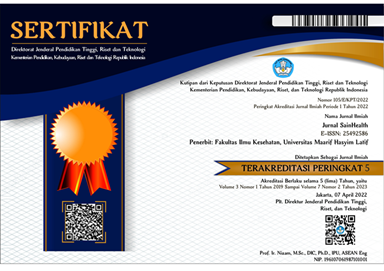ANALISIS NILAI SKOR-T LUMBAL, KADAR TNF-A, DAN HUBUNGANNYA PADA POSTMENOPAUSE OSTEOPOROSIS POSYANDU-LANSIA
DOI:
https://doi.org/10.51804/jsh.v5i2.1522.24-31Abstract
Indonesian women have four times higher rates of osteoporosis than men. This is caused by aging and the hormone estrogen, which halts production at menopause. Tumor Necrosis Factor-? (TNF-?) and other inflammatory cytokines play a role in the process of bone loss caused by an imbalance of osteoblast and osteoclast activity. This study aims to determine the prevalence of osteoporosis in postmenopausal women at the Elderly Integrated Service Post (Posyandu Lansia) based on the value of Bone Mineral Density (BMD) with lumbar T-score and TNF-levels and to analyze various possible relationships between the two. The research method has two stages. The first stage is screening activities at the Posyandu Lansia according to the inclusion and exclusion criteria using a questionnaire and measuring the BMD (bone mineral density) value with a sonometer. The second stage involves establishing the diagnosis of osteoporosis in 58 postmenopausal women with Dual Energy X-Ray Absorptiometry (DXA) and taking serum for analysis of TNF-? levels. TNF-? levels were determined using the ELISA.The results showed that the prevalence of osteoporosis in postmenopausal women at the Posyandu Lansia was 60.3% based on the value of bone mass density with a lumbar T-score. The percentage of the respondent group with TNF-? levels below the limit value on the standard curve for normal people in the kit (15.6 pg/mL) was 50%. Relationship analysis showed that there was no association between TNF-? levels and BMD values at the lumbar T-score (p value = 0.063 > 0.05). The same thing was also shown in the relationship between the osteoporosis group (Categories 1 and 2) and TNF-? levels (p-values of 0.864 and 0.788 respectively. Analysis of the relationship in this study needs to be carried out more deeply because of the classic and paradoxical effects of TNF-? on the role of osteoclastogenesis.
Keywords: osteoporosis, TNF-?, lumbar T-score, postmenopause womenDownloads
Published
Issue
Section
License
Jurnal SainHealth is licensed under Creative Commons Attribution 4.0 International License.
Under the following terms:
Attribution — You must give appropriate credit, provide a link to the license, and indicate if changes were made. You may do so in any reasonable manner, but not in any way that suggests the licensor endorses you or your use.
No additional restrictions — You may not apply legal terms or technological measures that legally restrict others from doing anything the license permits.
















